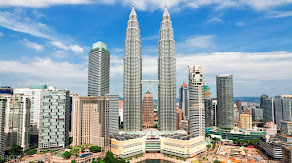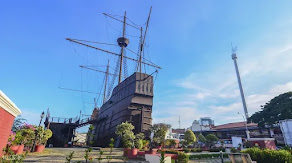 Malaysia is served with the latest telecommunication services worldwide. Public phones are abundant, especially at strategic or crowded places in the cities, towns and rural areas. The telephones are operated by coins, cardphone or both . International calls can be made from phone booth with card phone facilities or at any Telecoms offices. In places such as airport, the office of the Immigration Department, International Direct dial (IDD) public phones are also provided. Most hotels are equipped with IDD service with a minimal service charge.
Malaysia is served with the latest telecommunication services worldwide. Public phones are abundant, especially at strategic or crowded places in the cities, towns and rural areas. The telephones are operated by coins, cardphone or both . International calls can be made from phone booth with card phone facilities or at any Telecoms offices. In places such as airport, the office of the Immigration Department, International Direct dial (IDD) public phones are also provided. Most hotels are equipped with IDD service with a minimal service charge.From our Blog
Telecommunications
 Malaysia is served with the latest telecommunication services worldwide. Public phones are abundant, especially at strategic or crowded places in the cities, towns and rural areas. The telephones are operated by coins, cardphone or both . International calls can be made from phone booth with card phone facilities or at any Telecoms offices. In places such as airport, the office of the Immigration Department, International Direct dial (IDD) public phones are also provided. Most hotels are equipped with IDD service with a minimal service charge.
Malaysia is served with the latest telecommunication services worldwide. Public phones are abundant, especially at strategic or crowded places in the cities, towns and rural areas. The telephones are operated by coins, cardphone or both . International calls can be made from phone booth with card phone facilities or at any Telecoms offices. In places such as airport, the office of the Immigration Department, International Direct dial (IDD) public phones are also provided. Most hotels are equipped with IDD service with a minimal service charge.Postal Services
 Post offices are opened daily from 8am to 5 pm and closed on Sunday and public holidays (for Kedah, Kelantan and Terengganu, closed on Friday and public holidays). The General post Office in Kuala Lumpur is opened from 8 am to 6 pm daily and from 10 am to 12:45 pm on Sundays. Other than the ordinary delivery services, there is courier service called the Expedited Mail Service called theExpedited Mail Service (EMS) or locally known as Poslaju. Most international hotels is provide postal services at the front desks.
Post offices are opened daily from 8am to 5 pm and closed on Sunday and public holidays (for Kedah, Kelantan and Terengganu, closed on Friday and public holidays). The General post Office in Kuala Lumpur is opened from 8 am to 6 pm daily and from 10 am to 12:45 pm on Sundays. Other than the ordinary delivery services, there is courier service called the Expedited Mail Service called theExpedited Mail Service (EMS) or locally known as Poslaju. Most international hotels is provide postal services at the front desks. Customs formalities
a. currency
Visitors entering Malaysia may bring in or take out any amount of currency
 b. Dutiable and Non-Dutiable GoodsSome goods such as the following, imported by visitors are liable to duty: carpets, garments, clothing accessories, jewellery, chocolates, handbags, spirits, alcoholic beverages, tobacco and cigarettes. Visitors bringing in dutiable goods may have to pay a deposit for temporary importation, refunable on departure. The goods are to be presented at the time of departure at the point of exit together with the deposite receipts. Non-dutiable goods include cameras, watches, pens, lighters, perfumeries and cosmetics.
b. Dutiable and Non-Dutiable GoodsSome goods such as the following, imported by visitors are liable to duty: carpets, garments, clothing accessories, jewellery, chocolates, handbags, spirits, alcoholic beverages, tobacco and cigarettes. Visitors bringing in dutiable goods may have to pay a deposit for temporary importation, refunable on departure. The goods are to be presented at the time of departure at the point of exit together with the deposite receipts. Non-dutiable goods include cameras, watches, pens, lighters, perfumeries and cosmetics.
Yellow Fever vaccination is required for all visitors coming from yellow fever infected areas or endemic zones except for children under 1 year of age.
ENTRY FORMALITIES
(DRUGS TRAFFICKING OR ILLEGAL DRUGD CARRIES DEATH PENALTY)
 Visitors must be in possession of national passports or other internationally recognized travel documents, endorsed for travelling in Malaysia and with a period of validity of at least six months beyond the time of stay allowed in Malaysia.
Visitors must be in possession of national passports or other internationally recognized travel documents, endorsed for travelling in Malaysia and with a period of validity of at least six months beyond the time of stay allowed in Malaysia.
Visitors on social and business visit purposes are to be guided by the following visa requirements:
a. Visa Exemption
No visas are required for citizens of Commonwealth countries (except Bangladesh, India, Pakistan and Sri Lanka), British Protected Persons or citizens of the Republic of Ireland and citizens of Switzerland, Netherlands, San Marino and Liechtenstein.
b. Three Months Visa Free Visit Citizens of Albania, Austria, Algeria, Bahrain, Belgium, Czech Republic, Republic of Slovakia, Denmark, egypt, Finland, Germany, Hungary, Iceland, Italy, Japan, Jordan, Kuwait, Luxembourg, Lebanon, Morocco, Norway, North Yemen, Oman, Qatar, South Korea, Sweden, Saudi Arabia, Turkey, Tunisia, United States of America and United Arab Emirates are eligible for three months visa free visit.
Citizens of Albania, Austria, Algeria, Bahrain, Belgium, Czech Republic, Republic of Slovakia, Denmark, egypt, Finland, Germany, Hungary, Iceland, Italy, Japan, Jordan, Kuwait, Luxembourg, Lebanon, Morocco, Norway, North Yemen, Oman, Qatar, South Korea, Sweden, Saudi Arabia, Turkey, Tunisia, United States of America and United Arab Emirates are eligible for three months visa free visit.
c. One Month Vis Free Visit
Applicable to citizens of ASEAN countries.
d. 14-Days Visa Free Visit
Citizens of Afghanistan, Iran, Iraq, Syria and South Yemen are eligible for 14-days visa free visit.
e. 7-Days Visa Free Visit
Applicable to citizens of Bulgaria, romania and Russia
As regulations may change from time to time, it is advisable to check with the nearest Malaysian Embassy before your departure.
(DRUGS TRAFFICKING OR ILLEGAL DRUGD CARRIES DEATH PENALTY)
 Visitors must be in possession of national passports or other internationally recognized travel documents, endorsed for travelling in Malaysia and with a period of validity of at least six months beyond the time of stay allowed in Malaysia.
Visitors must be in possession of national passports or other internationally recognized travel documents, endorsed for travelling in Malaysia and with a period of validity of at least six months beyond the time of stay allowed in Malaysia.Visitors on social and business visit purposes are to be guided by the following visa requirements:
a. Visa Exemption
No visas are required for citizens of Commonwealth countries (except Bangladesh, India, Pakistan and Sri Lanka), British Protected Persons or citizens of the Republic of Ireland and citizens of Switzerland, Netherlands, San Marino and Liechtenstein.
b. Three Months Visa Free Visit
 Citizens of Albania, Austria, Algeria, Bahrain, Belgium, Czech Republic, Republic of Slovakia, Denmark, egypt, Finland, Germany, Hungary, Iceland, Italy, Japan, Jordan, Kuwait, Luxembourg, Lebanon, Morocco, Norway, North Yemen, Oman, Qatar, South Korea, Sweden, Saudi Arabia, Turkey, Tunisia, United States of America and United Arab Emirates are eligible for three months visa free visit.
Citizens of Albania, Austria, Algeria, Bahrain, Belgium, Czech Republic, Republic of Slovakia, Denmark, egypt, Finland, Germany, Hungary, Iceland, Italy, Japan, Jordan, Kuwait, Luxembourg, Lebanon, Morocco, Norway, North Yemen, Oman, Qatar, South Korea, Sweden, Saudi Arabia, Turkey, Tunisia, United States of America and United Arab Emirates are eligible for three months visa free visit.c. One Month Vis Free Visit
Applicable to citizens of ASEAN countries.
d. 14-Days Visa Free Visit
Citizens of Afghanistan, Iran, Iraq, Syria and South Yemen are eligible for 14-days visa free visit.
e. 7-Days Visa Free Visit
Applicable to citizens of Bulgaria, romania and Russia
As regulations may change from time to time, it is advisable to check with the nearest Malaysian Embassy before your departure.
Political System
Malaysia is a multi-party system since the first direct election of the Federal Legislative Council of Malaya in 1955 on a first-past-the-post basis. The ruling party since then has always been the Alliance Party coalition and subsequently from 1973 onwards, its successor the National Front coalition. The National Front currently consists of the United Malays National Organisation (UMNO), Malaysian Chinese Association (MCA), Malaysian Indian Congress (MIC) and 11 other political parties. Malaysia is a federal constitutional elective  monarchy. The federal head of state of Malaysia is the Yang di-Pertuan Agong, commonly referred to as he King of Malaysia. The Yang di-Pertuan Agong is elected to a five-year term among the nine hereditary Sultans of the Malay states; the other four states, which have titular Governors, do not participate in the selection.
monarchy. The federal head of state of Malaysia is the Yang di-Pertuan Agong, commonly referred to as he King of Malaysia. The Yang di-Pertuan Agong is elected to a five-year term among the nine hereditary Sultans of the Malay states; the other four states, which have titular Governors, do not participate in the selection.
 monarchy. The federal head of state of Malaysia is the Yang di-Pertuan Agong, commonly referred to as he King of Malaysia. The Yang di-Pertuan Agong is elected to a five-year term among the nine hereditary Sultans of the Malay states; the other four states, which have titular Governors, do not participate in the selection.
monarchy. The federal head of state of Malaysia is the Yang di-Pertuan Agong, commonly referred to as he King of Malaysia. The Yang di-Pertuan Agong is elected to a five-year term among the nine hereditary Sultans of the Malay states; the other four states, which have titular Governors, do not participate in the selection. The system of government in Malaysia is closely modeled on that of Westminster parliamentary system, a legacy of British colonial rule. In practice however, more power is vested in the executive branch of government than in the legislative, and the judiciary has been weakened by sustained attacks by the government during the Mahathir era. Since independence in 1957, Malaysia has been governed by a multi-party coalition known as the Barisan Nasional (formerly known as the Alliance).Legislative power is divided between federal and state legislatures. The bicameral parliament consists of the lower house, the House of Representatives or Dewan Rakyat (literally the "Chamber of the People") and the upper house, the Senate or Dewan Negara (literally the "Chamber of the Nation"). The 222-member House of Representatives are elected from single-member constituencies that are drawn based on population for a maximum term of five years. All 70 Senators sit for three-year terms; 26 are elected by the 13 state assemblies, two representing the federal territory of Kuala Lumpur, one each from federal territories of Labuan and Putrajaya, and 40 are appointed by the king. Besides the Parliament at the federal level, each state has a unicameral state legislative chamber (Malay: Dewan Undangan Negeri) whose members are elected from single-member constituencies.
 Parliamentary elections are held at least once every five years, with the last general election being in March 2008. Registered voters of age 21 and above may vote for the members of the House of Representatives and in most of the states, the state legislative chamber as well. Voting is not compulsory.
Parliamentary elections are held at least once every five years, with the last general election being in March 2008. Registered voters of age 21 and above may vote for the members of the House of Representatives and in most of the states, the state legislative chamber as well. Voting is not compulsory.Executive power is vested in the cabinet led by the prime minister; the Malaysian constitution stipulates that the prime minister must be a member of the lower house of parliament who, in the opinion of the Yang di-Pertuan Agong, commands a majority in parliament. The cabinet is chosen from among members of both houses of Parliament and is responsible to that body. State governments are led by Chief Ministers (Menteri Besar in Malay states or Ketua Menteri in states without hereditary rulers), who is a state assembly member from the majority party in the Dewan Undangan Negeri. In each of the states with a hereditary ruler, the Chief Minister is required to be a Malay Muslim, although this rule is subject to the rulers' discretion. The Constitution of Malaysia is codified and the system of government is based on the Westminster system. Although Malaysian politics has been relatively stable, critics allege that "the government, ruling party, and administration...are intertwined with few countervailing forces
Subscribe to:
Posts
(
Atom
)







